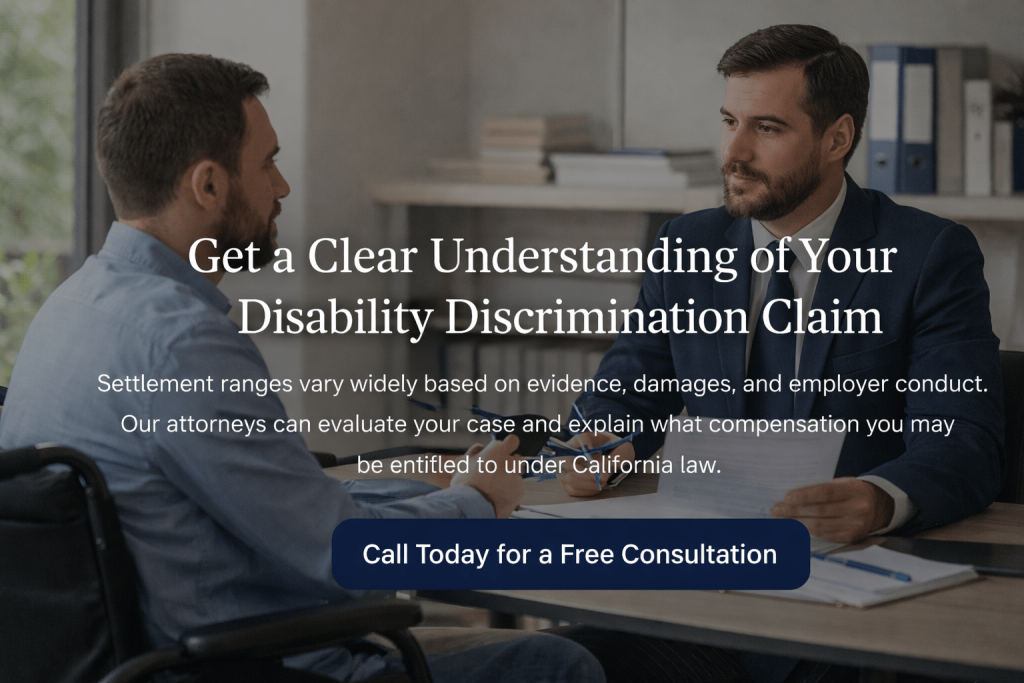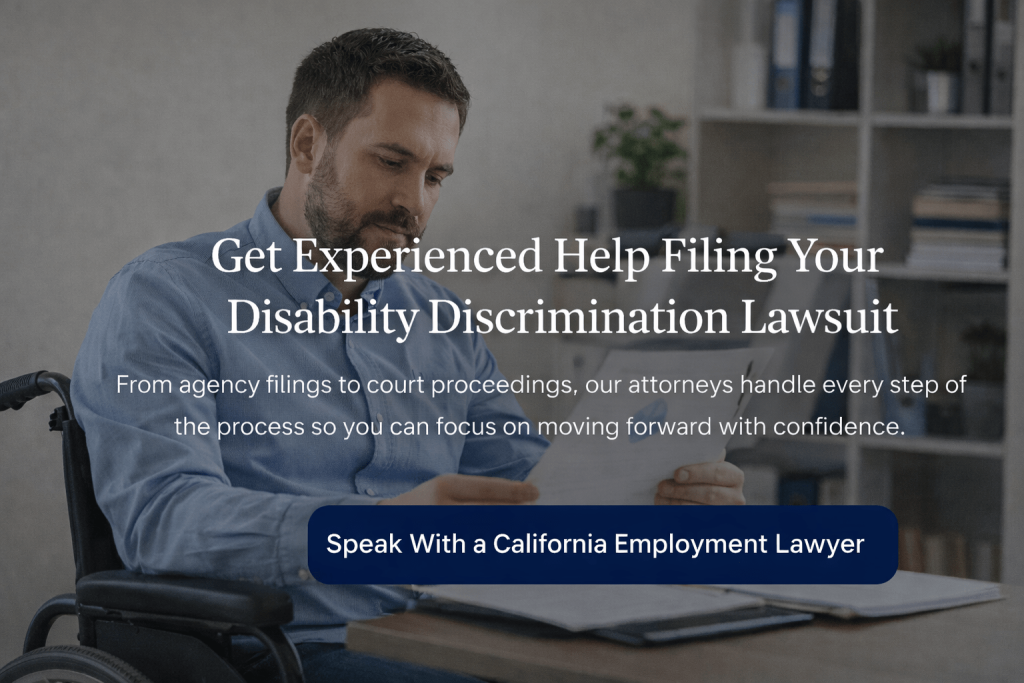Average Disability Discrimination Settlement Amounts in California

Disability discrimination settlement amounts in California can range from around $75,000 to $500,000 or more, with higher payouts in serious cases involving retaliation, wrongful termination, or a clear failure to accommodate. At Feher Law, we evaluate factors like lost wages, emotional distress, the employer’s size, the strength of your evidence, and whether your rights were violated under California’s FEHA to estimate the potential value of your claim.
If you’ve experienced disability discrimination at work, don’t guess what your case might be worth—talk to a dedicated California employment lawyer who can protect your rights and pursue maximum compensation. Call Feher Law today at (866) 646-6676 to get personalized guidance about your settlement options.
Do you have a valid disability claim?
To sue for disability discrimination in California, certain legal elements must be present. Here’s what needs to be established to strengthen your case:
- Protected disability status: As defined by California law, you must have a physical or mental impairment that limits a major life activity.
- Qualified for the job: You need to show that you can perform your job’s essential duties, with or without reasonable accommodations.
- Employer awareness: Your employer must have been informed of your disability and the accommodations you need to perform your job.
- Denied accommodations: If your employer failed to provide reasonable accommodations or denied them without legitimate justification, you may have grounds for a claim.
- Adverse employment action: If you faced termination, demotion, reduced hours, or other negative employment actions due to your disability, this supports your case.
- Link to discrimination: There must be a clear connection between the adverse action and your disability, proving that discrimination occurred.
Take the first step toward justice by filing a complaint or lawsuit to secure a fair disability discrimination settlement in California. Don’t wait, contact our Huntington Beach workplace discrimination lawyer and protect your rights today.
Typical disability discrimination lawsuit settlement amounts
Disability discrimination and retaliation settlements
Settlements involving both disability discrimination and employer retaliation often exceed $250,000, depending on the circumstances. Cases where an employer retaliates after an employee requests accommodations or files a complaint can lead to increased damages.
Compensation may include back pay, emotional distress damages, and future lost wages. Punitive damages can be awarded when retaliation is proven to be intentional and harmful.
ADA wrongful termination settlements
ADA wrongful termination settlements in California generally range from $100,000 to $500,000, depending on the case’s complexity. These cases involve an employer unlawfully firing an employee due to a disability or perceived disability.
Compensation often includes back pay, front pay, and damages for emotional distress. Punitive damages may be awarded if the termination was intentional and showed reckless disregard for the employee’s rights.
Failure to accommodate settlements
Settlements for failure to accommodate a disability typically range from $75,000 to $350,000. This occurs when an employer refuses to provide reasonable adjustments that would enable an employee to perform essential job functions.
Compensation can cover lost wages, emotional suffering, and future lost income. If the failure was intentional or ongoing, punitive damages may also be awarded to hold the employer accountable.
Additional reading: discrimination lawsuit settlement
Factors that influence the average disability discrimination settlement
Several factors can affect the settlement amount in a disability discrimination case. These elements can help you set realistic expectations and strengthen your legal claim.
Case complexity and legal challenges
More complex disability discrimination cases—especially those involving multiple legal claims or serious violations of employment law—often result in higher compensatory settlements. Disputes over key facts, conflicting interpretations of the law, or extensive evidence needs can increase the value of a claim because they raise the employer’s financial and legal exposure.
Complex cases may require deeper investigation, expert testimony, or detailed documentation, which can strengthen your position and encourage higher settlement offers. Employers are more likely to settle when they see that continued litigation could lead to greater compensatory damages and higher defense costs.
Quality of legal representation
Our experienced employment attorneys understand how to present evidence, negotiate settlements, and proceed through the court procedures. Our skilled lawyers will advocate for your rights, increasing your chances of receiving a higher payout.
Employers are less likely to offer low settlements when facing reputable legal teams. The presence of our determined and knowledgeable attorneys often forces employers to reconsider their legal exposure. With the right legal representation, you can secure the best possible outcome.
Filing deadlines and timeliness
California law requires filing with the DFEH or EEOC within specific deadlines, typically 300 days from the discriminatory act. Missing these deadlines can result in losing your right to sue.
Timely action shows the court that you took the situation seriously and acted in good faith. Courts are less sympathetic to plaintiffs who delay filing without a valid reason. Proactive filing also means that evidence is fresher and more accessible.
Delays can cause witnesses to forget key details or important documents to be misplaced. Employers may also claim that circumstances changed if too much time has passed. Filing promptly protects your case and prevents employers from using time-related defenses.
Administrative process compliance
Before pursuing a lawsuit, you must exhaust administrative remedies by filing a formal complaint with the DFEH or EEOC. This process involves investigation, mediation, or issuing a right-to-sue letter. Failing to comply with these steps can derail your legal claim.
The administrative review process can also help clarify the strengths and weaknesses of your case. A favorable outcome during this phase can encourage employers to settle early. Courts take this process seriously and expect plaintiffs to follow it properly.
Skipping this step can lead to case dismissal, even if you have strong evidence. Properly completing administrative procedures strengthens your legal position. It also signals that you are serious about pursuing justice through all available legal channels.
Strength of supporting evidence
Clear documentation such as emails, performance reviews, and internal complaints can build a strong foundation. Specific details like dates, times, and incident descriptions add credibility.
We ensure that your supporting evidence is well-organized and presented effectively to maximize your settlement. The clearer your evidence, the harder it is for the employer to dispute your claims. Comprehensive evidence can make employers more willing to settle rather than risk losing in court.
Supporting evidence also includes witness statements from coworkers or supervisors. Independent accounts can corroborate your claims and demonstrate patterns of misconduct. Strong evidence often leads to faster and more favorable settlements.
Accommodation request history
Evidence of requesting reasonable accommodations for their disability is vital in a disability discrimination case. You must show that you informed your employer of your needs and that accommodations were denied or ignored. This can prove the employer’s failure to meet legal obligations.
Written accommodation requests such as emails or HR communications are especially valuable. They create a clear record that the employer was aware of your needs. If no accommodations were made, these records strengthen your claim of unlawful treatment.
Employers who fail to respond appropriately to documented requests are more likely to face legal consequences. Courts consider an employer’s failure to accommodate as a serious violation of disability law. Properly documented requests often lead to stronger settlements.
Testimonies from witnesses
Colleagues who witnessed discriminatory acts or retaliation can provide firsthand accounts of what happened. Their statements can add credibility to your claims.
Courts place significant weight on witness statements, especially when multiple individuals back your account. Independent testimonies reduce the likelihood that your claims will be dismissed as hearsay. Witnesses can also describe patterns of behavior that may otherwise go unnoticed.
Our attorneys will secure critical witness statements early in the process to strengthen your case. Testimonies from respected colleagues or supervisors can be especially powerful. Their support may pressure employers to settle rather than risk damaging testimony at trial.
Adverse employment actions taken
Adverse actions such as termination, demotion, or reduced hours are clear signs of workplace discrimination. These actions directly impact your career and strengthen your claim. Courts look closely at how such actions affect your financial and professional well-being.
Employers often try to justify adverse actions with performance-related reasons. Having performance reviews or job records that contradict their claims can weaken their defense. Establishing a clear link between the adverse action and your disability is key.
Multiple adverse actions can increase the settlement amount significantly. Courts may award higher damages if the employer engaged in a pattern of harmful conduct. The more severe and lasting the consequences, the larger the potential payout.
Career and earning potential impact
If your career path was disrupted, you may be entitled to front pay and compensation for missed promotions. Courts consider the career impact of the discrimination when awarding damages.
Evidence of lost income, missed career opportunities, and difficulty finding new employment strengthens your claim. Showing that discrimination caused lasting harm can lead to higher settlements. A financial expert may even be called upon to estimate your future losses.
Employers may be required to pay for professional retraining or job placement services. The larger the impact on your earning potential, the more likely the court will order significant compensation. This ensures that you’re financially protected despite the discrimination you face.
Efforts to reduce damages
Courts expect you to take reasonable steps to minimize your damages after experiencing discrimination. This means actively seeking new employment or retraining opportunities when possible. Failing to do so could reduce your settlement.
Keeping job search records, application confirmations, and interview logs can show that you made genuine efforts. Being proactive strengthens your case by demonstrating good faith. This helps counter any employer claims that you didn’t try to improve your situation.
Courts may reduce compensation if you fail to mitigate your losses. However, if you can prove that finding new work was challenging due to discrimination-related damage, you can still secure significant damages. Mitigation efforts show that you took responsibility for your future.
Employer retaliation after reporting
Retaliation includes being fired, demoted, harassed, or experiencing other negative consequences after filing a complaint.
Courts take retaliation claims seriously because they discourage employees from exercising their legal rights. Proving retaliation often leads to punitive damages aimed at punishing the employer. These damages can far exceed regular compensation awards.
If you can show that the retaliation was intentional and malicious, your case becomes even stronger. Evidence like threatening emails or demotions after complaints can support a higher settlement. Employers face serious consequences for retaliating against employees.
Emotional distress and psychological harm
Courts consider emotional distress damages alongside lost wages and other financial losses. Psychological harm must be supported by credible evidence such as medical records or therapist evaluations.
Testimony from mental health professionals can explain how the discrimination affected your well-being. This helps demonstrate the seriousness of your claim. Emotional damages can include anxiety, depression, and even post-traumatic stress disorder (PTSD).
Employers may push back on emotional distress claims due to their subjective nature. However, well-supported mental health evidence can result in significant compensation. Cases involving severe emotional trauma often lead to higher settlements.

Employer’s history of discrimination claims
Courts may see a history of unresolved complaints as evidence of a company culture that tolerates discrimination.
Employment records showing repeated violations can be powerful supporting evidence. They can also weaken the employer’s credibility if past issues go unresolved. A history of similar claims shows that the current case is not an isolated incident.
Employers may be more willing to settle quickly if they fear further legal scrutiny or public backlash. Patterns of discrimination often lead to larger settlements. Courts may impose stricter penalties on companies with a history of misconduct.
Insurance coverage and policy limits
These policies typically set limits on how much the insurer will pay. Knowing the employer’s policy limits can help set realistic settlement expectations.
Employers may be more willing to settle within insurance limits to avoid paying out of pocket. If the potential damages exceed the coverage, the employer may choose to fight the claim in court. The size of the policy can directly impact the final payout.
Courts consider available insurance coverage when determining settlements. If coverage is insufficient, the employer might be personally liable for additional damages. Large companies usually have higher policy limits, which can work in your favor.
Economic damages and financial losses
Economic damages play a major role in determining the value of a disability discrimination settlement. Courts look closely at the amount of back pay, front pay, lost benefits, missed promotions, and long-term earning capacity impact. The more significant the financial harm, the higher the potential compensation.
Documenting wage history, benefit losses, and income gaps strengthens your claim and provides a clear picture of the monetary impact. Financial experts may also be used to calculate future losses resulting from career disruption. Strong evidence of economic damages often increases settlement value substantially.
Employer intent and the severity of misconduct
The employer’s intent is a critical factor when evaluating settlement amounts. Cases involving intentional discrimination, bad faith, or reckless disregard for disability rights typically result in higher payouts. Courts treat malicious conduct as especially serious and may award punitive damages when the employer’s actions show oppression, fraud, or malice.
Evidence of deliberate retaliation, repeated violations, or efforts to conceal misconduct can significantly increase the value of your claim. Employers who knowingly violate disability laws face greater legal exposure, making them more likely to settle for higher amounts to avoid trial.
Employer size, financial resources, and insurance limits
Larger employers often have greater financial resources and higher insurance coverage, which can lead to larger settlement outcomes. Companies with extensive assets or large revenue streams may face increased pressure to settle significant claims, especially when public exposure or reputational damage is a concern.
Insurance policy limits also influence how much compensation is available. Employers with robust liability coverage may resolve cases at higher amounts, while those with limited coverage might contest claims more aggressively. Understanding the employer’s resources helps set realistic expectations for settlement negotiations.
Overall case strength and credibility of evidence
The strength of your case is directly tied to the quality and consistency of your evidence. Detailed documentation, credible witness statements, and clear timelines make it easier to establish discrimination and prove damages. Courts rely heavily on well-supported claims that demonstrate a pattern of unlawful behavior.
Inconsistent records or gaps in documentation may weaken your position, making employers less willing to offer fair settlements. A highly organized, evidence-driven case increases leverage in negotiations and often leads to more favorable outcomes.
Impact of California’s FEHA protections
California’s Fair Employment and Housing Act (FEHA) provides broader protections than federal law and allows for higher damages in disability discrimination cases. Unlike federal ADA limits, FEHA has no caps on emotional distress or punitive damages, which can significantly increase settlement potential.
Cases filed under FEHA often result in higher compensation because the law is more favorable to employees and offers stronger remedies. This legal framework gives workers additional leverage, encouraging employers to settle rather than risk a substantial verdict at trial.
Willingness to settle or go to trial
Settlements save employers from costly legal battles and potential reputational damage. This often results in quicker resolutions.
However, if the employer refuses to settle, the case may proceed to trial, where the outcome is less predictable. Going to trial can increase potential compensation due to punitive damages or court-ordered awards.
Employers weigh the costs of settling versus defending in court. A strong legal case may pressure them into settling rather than risking a large verdict. Skilled attorneys can leverage this to secure maximum compensation.
Knowing whether you have a valid disability discrimination claim can be complicated. That’s why our experienced California workplace discrimination lawyers are here to assess your case during a free consultation. We’ll evaluate your circumstances and explain your legal options.
What you can claim for in disability lawsuit settlements
In a disability discrimination lawsuit, several types of compensation may be available based on the specific details of your case. These claims fall into different categories, each addressing various aspects of the harm you suffered. Here’s a breakdown of what you can seek in a settlement:
Economic damages
Economic damages cover tangible financial losses directly resulting from disability discrimination. This includes back pay for lost wages, missed promotions, and denied raises. Future wages, also known as front pay, may be awarded if you can’t return to your previous job or industry.
Medical expenses related to mental health treatment, counseling, or therapy can also be claimed. Reimbursement for job search expenses, relocation costs, or retraining programs may be included. Any documented out-of-pocket expenses related to the discrimination can strengthen your claim.
Courts calculate economic damages based on clear financial records and expert testimony. The more comprehensive your documentation, the higher the potential compensation. Accurate records ensure that your financial losses are fully accounted for.
Non-economic damages
Non-economic damages compensate for emotional distress, pain and suffering, and psychological trauma caused by discrimination. Anxiety, depression, and loss of enjoyment of life fall into this category.
These damages are often supported by mental health professional evaluations and personal impact statements. Medical records detailing counseling sessions and treatment plans can strengthen your claim. Emotional distress is typically calculated based on the severity and duration of the harm.
Since non-economic damages are harder to quantify, the court’s assessment depends on the quality of the evidence presented. A strong case may lead to significant compensation. Emotional damages often account for a large portion of settlements in discrimination cases.
Punitive damages
Punitive damages are awarded when the employer’s actions were especially malicious, reckless, or intentional. They aim to punish the employer and prevent similar behavior in the future.
These damages are typically reserved for extreme cases involving willful discrimination, retaliation, or repeat offenses. Courts impose punitive damages when regular compensation alone is insufficient to address the misconduct.
Employers found guilty of severe violations may face substantial punitive awards. This is especially true if their actions were part of a broader pattern of workplace discrimination. Employers with a history of similar claims are more likely to be penalized harshly.
Legal costs and lawyer fees
Successful disability discrimination lawsuits often include reimbursement for our legal costs. This covers your attorney fees, filing expenses, court costs, and expert witness fees.
Employers are typically ordered to pay these costs when the court rules in favor of the plaintiff. This prevents victims from bearing the financial burden of pursuing justice. Legal cost awards ensure that employees can access our high-quality representation.
Even in cases resolved through settlements, legal fees are often negotiated as part of the final agreement. Having our experienced attorneys increases the likelihood of securing reimbursement for legal expenses.
Medical expenses
This includes therapy sessions, psychiatric evaluations, and medications prescribed due to emotional distress.
Medical experts can testify about the mental and physical effects of workplace discrimination. Having clear medical records linking your condition to discrimination can increase the value of your settlement. Courts take these claims seriously when supported by professional evaluations.
Treatment plans, invoices, and medical reports provide essential evidence. A detailed medical history strengthens your claim by showing how the discrimination affected your overall well-being. Significant medical costs can increase the final settlement amount.
Lost employment benefits
Disability discrimination can result in the loss of essential job-related benefits. This includes health insurance, retirement contributions, paid time off, and bonuses.
Courts often award compensation to cover lost benefits if you were terminated, demoted, or forced to quit due to discrimination. This ensures that employees aren’t left without critical financial protections.
Documenting the benefits you were entitled to before the discrimination occurred can strengthen your claim. Statements from HR or payroll departments may be used to prove the financial impact. Courts factor in benefit loss when calculating damages.
Career and professional development losses
Missed promotions, lost networking opportunities, and reduced industry reputation can have lasting effects on your career prospects and professional growth.
Courts may award front pay for the future earnings you could have achieved if your career had progressed normally. This compensates for long-term income loss due to discrimination-related setbacks.
Career experts or financial analysts may provide testimony to estimate lost earnings. This helps ensure that your future earning potential is reflected in the settlement amount. Significant career disruption can result in a higher payout.
Reinstatement or job placement assistance
In some cases, courts may order your employer to reinstate you to your previous job or a comparable role. If returning to the same workplace is not feasible, the court may require the employer to provide job placement assistance.
Reinstatement is more common in cases where the working relationship can be repaired. If this isn’t possible, alternative compensation such as front pay may be awarded instead.
Job placement services can cover resume writing, career counseling, and interview coaching. These services help victims of discrimination return to the workforce and rebuild their careers. This type of award is common in employment-related legal cases.
Fight back against disability discrimination to pursue the settlement you deserve in California. Start your case today by contacting our Torrance workplace discrimination lawyer.
Wondering what your California disability discrimination claim could be worth?
If you’ve faced discrimination at work because of a physical or mental disability, you may be entitled to a financial settlement. Potential compensation can cover things like missed wages, future income, emotional suffering, and even punitive damages in more severe cases.
To help you estimate the possible value of your claim, we’ve created a disability discrimination settlement calculator designed specifically for California workers. It’s private, simple to use, and gives you a personalized estimate in minutes.
Get started today—use our disability discrimination settlement calculator to find out what your claim might be worth.
Disclaimer: The results from this calculator are for informational purposes only and do not constitute legal advice. Actual settlement amounts vary based on case details and legal representation.
How to prove discrimination
Proving disability discrimination in the workplace requires solid evidence demonstrating unfair treatment based on your disability. Below are the key elements needed to build a strong legal case:
- Proof of disability: Obtain medical records, doctor’s notes, or certifications confirming your disability and how it affects your ability to work.
- Accommodation requests: Submit formal written requests for reasonable accommodations, specifying what support you need to perform your job duties.
- Employer’s conduct: Track how your employer responded to your disability disclosure and accommodation requests, especially if they failed to act fairly or provide support.
- Timeline of events: Establish a timeline showing how negative actions closely followed your disability disclosure or accommodation request, indicating potential discrimination.
- Adverse employment action: Document any harmful job-related actions such as termination, demotion, or reduced hours that occurred after you disclosed your disability.
- Unequal treatment: Show how you were treated differently from non-disabled employees in promotions, assignments, or disciplinary matters, despite having similar qualifications.
- Statements from witnesses: Collect testimonies from coworkers or supervisors who saw discriminatory behavior or heard offensive remarks about your disability.
- Legal guidance from our team: Consulting with our experienced employment lawyers ensures your case is properly structured, supported by strong evidence, and presented effectively in legal proceedings.
How to start a lawsuit for disability discrimination in California
If you’ve experienced disability discrimination at work, you may have grounds to file a lawsuit related to disability discrimination under California’s Fair Employment and Housing Act (FEHA) or the federal Americans with Disabilities Act (ADA).
At Feher Law, we can guide you through every step of the legal process, minimizing the stress while maximizing your chances for success.
Filing under the Fair Employment and Housing Act (FEHA)
- We explain FEHA’s scope: FEHA applies to employers with five or more employees and offers broader protections than federal law, ensuring California workers have strong legal support.
- We file a complaint with CRD: We’ll submit a complaint on your behalf to the California Civil Rights Department (CRD) within the three-year legal timeframe from the date of the discriminatory act.
- We participate in the investigation: The CRD will investigate your claim and may facilitate mediation between you and your employer. We’ll be by your side throughout the process.
- We obtain a right-to-sue notice: If the CRD can’t resolve the issue, we’ll request a right-to-sue notice, allowing us to file a lawsuit in civil court on your behalf.
- We provide legal representation: Our experienced employment attorneys will handle every aspect of the lawsuit, protecting your rights while pursuing the maximum possible compensation.
Filing under the Americans with Disabilities Act (ADA)
- We assess ADA applicability: The ADA covers employers with 15 or more employees and prohibits disability discrimination nationwide. We’ll determine if your case qualifies under federal law.
- We file a charge with the EEOC: We’ll submit a charge to the Equal Employment Opportunity Commission (EEOC) within 300 days of the discriminatory incident, ensuring your case stays within federal deadlines.
- We cooperate with the EEOC investigation: We’ll manage communications with the EEOC, present supporting evidence, and guide you through any mediation processes offered by the agency.
- We secure a notice of right to sue: If the EEOC can’t resolve your case, we’ll obtain a right-to-sue notice and file a federal lawsuit on your behalf.
- We provide expert legal counsel: Our skilled attorneys will handle every legal detail, ensuring your rights are protected while pursuing the best possible outcome for your case.
FEHA vs. ADA Disability Discrimination Lawsuit Process Overview
| Process Step | FEHA (California Law) | ADA (Federal Law) |
|---|---|---|
| Employer Coverage | 5+ employees | 15+ employees |
| Where Claim Is Filed | California Civil Rights Department (CRD) | Equal Employment Opportunity Commission (EEOC) |
| Filing Deadline | Up to 3 years from the discriminatory act | 300 days from the discriminatory act |
| Investigation & Mediation | CRD investigates and may offer mediation | EEOC investigates and may offer mediation |
| Right-to-Sue Letter | Required before filing a civil lawsuit | Required before filing a federal lawsuit |
| Available Damages | Unlimited emotional distress & punitive damages under FEHA | Emotional distress and punitive damages allowed but typically more limited |
| Advantages | Broader protections, stronger remedies, California-specific worker rights | Nationwide protections, useful when employers fall under federal coverage |
| Legal Representation | Feher Law handles filing, investigation support, and litigation | Feher Law manages federal filings, EEOC communications, and lawsuit process |
Trust Feher Law to maximize your disability discrimination payout
If you’ve experienced disability discrimination in the workplace, you don’t have to face it alone. At Feher Law, we are committed to securing the highest possible compensation for our clients. Our experienced employment discrimination attorneys will handle every aspect of your case, from filing a claim to negotiating a settlement or taking the matter to court.
We know how challenging this process can be, and we’re here to provide the legal expertise and personal support you deserve. Let us fight for your rights while you focus on moving forward. Call us at (866) 646-6676 or Contact Us online today!
FAQs
What makes a strong disability discrimination case?
A strong disability discrimination case includes clear evidence of your disability, documented accommodation requests, and proof of adverse job actions like termination or demotion. Witness statements, performance records, and employer communications can strengthen your claim. Consulting an experienced employment attorney ensures the best legal strategy for maximum compensation.
How to calculate a discrimination settlement amount
Discrimination settlement amounts depend on factors like lost wages, emotional distress, legal fees, and punitive damages. Courts also consider the severity of the employer’s misconduct and how long the discrimination lasted. An experienced attorney can estimate your potential payout based on similar past cases and specific case details.
Is it worth suing for discrimination?
Suing for discrimination can be worth it if you’ve experienced significant job loss, emotional distress, or financial hardship. Settlements can cover lost wages, career setbacks, and emotional damages. Consulting with an experienced employment lawyer helps determine whether pursuing a lawsuit is likely to result in meaningful compensation.
How long does a disability discrimination lawsuit take?
A disability discrimination lawsuit can take anywhere from a few months to several years, depending on case complexity and court schedules. Cases resolved through mediation or settlement typically conclude faster. If the case goes to trial, expect a longer timeline due to pre-trial preparations, hearings, and court proceedings.
Can I lose my job because of a disability?
Employers cannot legally terminate you due to a disability if you can perform essential job functions with reasonable accommodations. However, wrongful termination still occurs. If you believe your employer fired you due to your disability, consult an employment lawyer to explore legal remedies and potential compensation.
Related Posts

Nine Injured in Los Angeles Metro Train SUV Collision

Two Injured in San Diego Multi-Car Accident

Suspect Hospitalized After Hollywood LAPD Pursuit Crash

Four Injured in Downtown Los Angeles Crash

Pedestrians Injured in LA Sidewalk Crash






